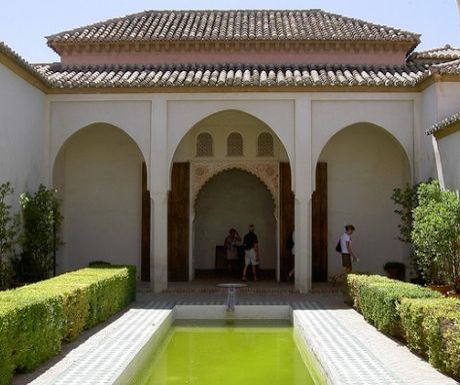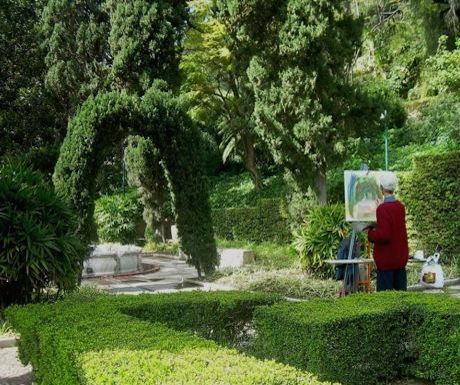With its privileged position on the temperate Mediterranean coast and as one of the southern most cities in mainland Europe, its little wonder that the city of Malaga would be so alive with lush and thriving gardens. Indeed, many private gardens on the hills above the city would themselves be worthy of an entrance fee for a quick tour. But the many municipal and public garden spaces will keep you busy enough, wandering and wondering at the selection of Mediterranean, tropical and subtropical varieties, or maybe just contemplating your next move under the shade of an ancient cedar.
Thanks in large part to the Moorish influence that began more than a thousand years ago, in a time when they had already mastered the use of running water, hydraulics and shady courtyards, all of Andalucia contains beautiful examples of a unique style of formal gardening; Malaga is no exception. Garden lovers will relish in a wider tour of Andalucia, but here are five stunning gardens right within the city of Malaga that are sure to inspire.
La Concepcion Botanical-Historical Gardens
By far the largest and most impressive garden in Malaga with some 23 hectares, La Concepcion began as a private property and personal project of the Marquis and Marchioness of Loring in 1855. They collected rare and exotic plant species from around the globe until the time of their deaths, at which time new private buyers carried on with the maintenance and expansion of the gardens. It was only in 1990 that the Malaga City Council purchased the estate and began preparing the gardens as a public attraction; the gardens opened to the public in 1994. The result today is an incredibly impressive collection of mature and diverse plants and trees, including an forested arboretum with numerous trees more than 100 years old. The palm collection is considered one of the finest in Europe with nearly 100 different species, some of which rank as the biggest in Spain and others that are rarely seen at this latitude. The bamboo forest, aquatic plants, orchids and bromeliads are among other stand out features, while rivers, ponds and trickling streams appear throughout. The walking route, Around the world in 80 trees is also particularly enchanting and virtually everything everywhere is labeled; it makes you marvel at the meticulous maintenance and specialist knowledge involved.

Paseo del Parque
This long and relatively narrow city park lies a stones throw from the port opening onto the Mediterranean on one side and the edge of the city centre on the other side. While one of Malagas busiest thoroughfares passes by on the city side of the park, the park itself is a haven of calm within the city. The park was designed at the end of the 19th century following a land reclamation project that pushed the sea further south, and Malagas standing as a major port of trade with the Americas and the east contributed to the addition of many exotic and unusual species that have had more than a hundred years to develop. The variety of tropical and subtropical flowering shrubs and trees ensures colour and fragrance throughout the year. The park is also popular for the concerts offered every Sunday by the Malaga Municipal Band at the auditorium housed within the park.

Pedro Luis Alonso Gardens
A well designed formal garden just across from the Paseo del Parque, the Latin-styled Pedro Luis Alonso Gardens cover 6500 square metres and incorporate Moorish, Hispanic and French elements evident in the long shallow pools and low lying fountains, colourful beds contained by low symmetrical hedges, and orange and other fruit trees for shade, aroma and yet more colour. The rose garden makes a particular impact and comprises 75 varieties from across the globe. Native son and architect Guerrero Stachan designed the gardens alongside the neo-baroque Malaga town hall he also designed, and he himself was mayor of Malaga in the years before his death. He designed numerous other important gardens and buildings in Malaga, leaving a lasting impact for the close harmony between architecture and gardens that he so successfully conveyed.

The Alcazaba and Gibralfaro Gardens
The old Moorish fortress that is the 11th century Alcazaba of Malaga, and the Gibralfaro castle above are the most important historical landmarks in the city and offer some of the most impressive views over the city as well. The Alcazaba of Malaga is actually the best preserved alcazaba in all of Spain, though it is very much overshadowed by the grandeur of the Alhambra in Granada. Still, with architecture and gardens reminiscent of those of the world famous Alhambra its surprising that the site is not better known. While many parts of the structure of the Alcazaba and the Gibralfaro have understandably fallen into disrepair, many areas have been carefully preserved and the garden areas have been restored to reflect their former glory with sharply cut symmetrical hedges, courtyards shaded with fragrant orange trees and lush borders. Yet some of the most impressive parts of the gardens are those that have not been pristinely restored, where towering cypress trees line the brick laden walkways and naturally influenced growth sparks your imagination to consider the passage of time and what it might really have been like here at the time when this was one of the most important and beautiful centres of civilization on Earth.

Jardines de Puerta Oscura
Translated as the gardens of the dark door (or entrance), the name relates to the gate of Moorish origin leading into the Alcazaba and the Gibralfaro. The site was later transformed by Guerrero Stachan to transform what was previously a rugged, rocky slope into a series of promenades and terraces populated by fountains and pavilions with a new surprise around every corner of the zig-zagging walkway. Very central to the city, these gardens make for the perfect leisurely, pleasant stroll before or after a venture into the old centre of Malaga for some lovely tapas and wine.
